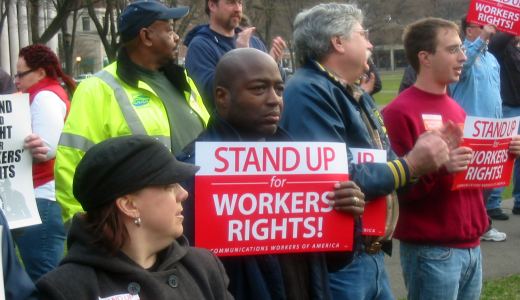
HARTFORD, Conn. – Thousands of state workers are expected to fill the State Armory on Saturday, June 4, for a question and answer session about the tentative agreement hammered out by their unions in the State Employees Bargaining Agent Coalition (SEBAC) and Governor Dannel Malloy (D).
Over 45,000 workers are preparing to vote later this month. Information sessions and local meetings are being held at work sites across the state to explain the complicated proposal which includes wage and benefit cuts but no layoffs. During negotiations, SEBAC succeeded in reducing proposed concessions from $2 billion to $1.6 billion over two years.
The concessions are part of the state budget adopted by the Legislature earlier this month. If state workers decline to ratify the proposal, the budget will be re-opened, with 4,000 layoffs and further cuts to human services threatened.
“The leaders from SEBAC’s 15 unions unanimously support the agreement and believe it provides public service workers a platform on which to continue our fight for a fair economy,” said Sal Luciano, director of AFSCME Council 4, in a letter to his members.
“The agreement grows from the conviction that we must survive the anti-worker tide sweeping our country and emerge with the strength needed to be part of the long-term solution,” he concluded. AFSCME is the largest union in the coalition.
The tentative agreement insures job security through June 30, 2015. The current pension and healthcare agreement is extended to 2022. The wage agreement which expires next year would be extended through 2016 with a two year wage freeze. The agreement adopts Value Based Health Care in which workers sign a commitment form each year to get annual physicals, diagnostics and dental cleanings. Details of the tentative agreement are available at the In This Together website.
While the state budget has been hailed as a national model for limiting cuts to human services, maintaining funding to cities and towns and adding an Earned Income Tax Credit, there has been sharp criticism. By including state worker concessions in the budget, Governor Malloy put state workers in the position of unjustly being held responsible for deep cuts in human services if they do not ratify the agreement.
The unions approached the situation with a focus on creativity and member involvement. They went to the bargaining table with their own suggestions of how and where cost savings could take place without causing layoffs or cuts in services, and proposals for where additional revenue could come from.
They initiated In This Together Connecticut, with the goal of achieving “a fair budget and a livable state with great public services.” They launched an on-line petition which states, “The economy is tougher than it’s ever been. Cutting vital public services like education, healthcare and public safety will only leave families suffering more.”
The Better Choices for Connecticut coalition, made up of state workers unions, private sector unions, service providers and community groups developed its own program for balancing the budget by making the state’s tax system more fair.
If the highest incomes in Connecticut were taxed at a rate equal to that of lower tax payers, enough revenue would be raised to meet the budget shortfall. The amount received by top earners from the extension of Bush tax cuts would close the gap, eliminating any need to consider concessions or cuts to services.
The Connecticut Action Alliance for a Fair Economy, spearheaded by SEIU and the Connecticut Citizens Action Group (CCAG) focused on Bank of America, the largest bank in Connecticut, which paid zero taxes by taking advantage of loopholes in the law.
This “tax the rich” message was voiced at each of 17 town hall meetings on the budget held by Governor Malloy throughout the state. In addition, several large rallies were held at the state capitol in solidarity with the public workers of Wisconsin and Connecticut.
These actions helped to shape public opinion. The budget was adjusted to require more from incomes over $1 million, and remove some measures which would have added to the tax burden on middle income families.
The Yankee Institute and other anti-union websites have vilified state workers and the wages and benefits they fought for and won since the 1970’s.
“Tell your co-workers not to trust the myths, rumors, and lies being circulated by our opponents who want to force job, benefit, and service cuts. Tell them to get the facts,” said Luciano.
Connecticut labor and community coalitions are discussing how to increase their strength as they prepare for the next steps in the struggle for a fair and just budget that prioritizes needed services and workers’ rights
Photo: Connecticut workers’ solidarity rally in New Haven, April 4, 2011. Art Perlo/PW












Comments